 |
Kel-Tec PF-9 Pistol Updated January 8, 2011 |

 |
Kel-Tec PF-9 Pistol Updated January 8, 2011 |
This review reflects my own experience with my (no longer) new Kel-Tec PF-9 (Kel-Tec's Website is HERE), but I have also drawn on articles and reviews found on the internet in various places. The photos are my own, but you are welcome to borrow them, if you like. For more resources and some specific acknowledgements see the last paragraph of this article.
Kel-Tec has a lot of vocal fans, and they begged for a single-stack 9mm pistol for years. Finally, Kel-Tec heard their cries, and came through with the PF-9. I bought my first one in August 2007. Every now and then I trade for something else, but I always end up coming back to the PF-9. I bought number four in August of 2010. These days Kel-Tec sells the PF-9 in a nice cushioned black plastic box...
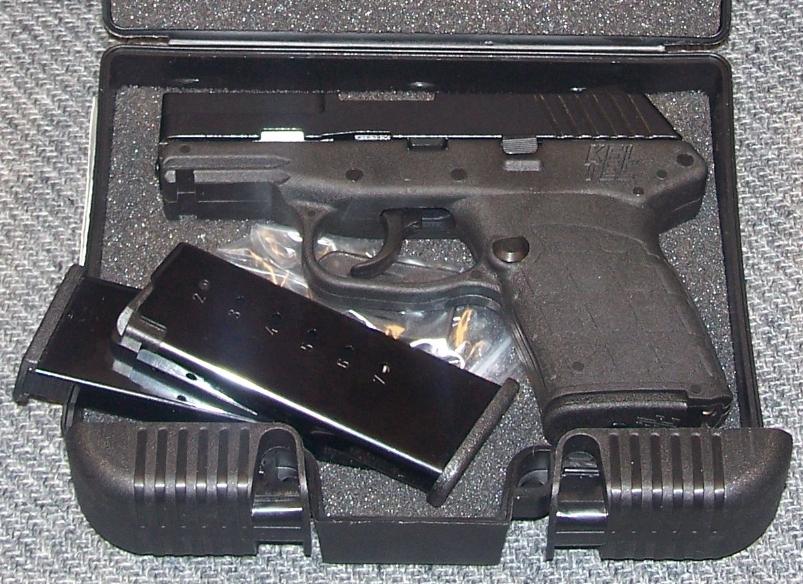
My latest PF-9
Kel-Tec announced impending production on their website, and on the KTOG forums on November 11, 2005--and made an official public announcement at the SHOT show in February of 2006. The Kel-Tec announcement read:
"The PF-9 is a semi-automatic, locked breech pistol, chambered for the 9 mm Luger cartridge. It has been developed from our highly successful P-11 and P-3AT pistols with maximum concealability in mind. The PF-9 has a single stack magazine holding 7 rounds. It is the lightest and flattest 9 mm ever made. Firing mechanism is Double-Action Only with an automatic hammer block safety. The PF-9 will be available in blued, parkerized, and hard chrome finishes. Grips will be in black, grey, and olive drab. The PF-9 accessory rail will accept the latest compact weapon lights and lasers.
"The PF-9 retains the best features from our P-11 and P-3AT pistols combined into the flattest and lightest single stack 9mm configuration ever made. The barrel, locking system, slide stop, assembly pin, front sight, recoil springs and guide rod are adapted from the P-11. The PF-9 is nearly identical to the P-11 in length and height and shares the same exterior controls. The shorter trigger system with integral hammer block and the extraction system are adapted from the P-3AT. Just like the P-11, the PF-9 will accept +P ammunition, however, not with continuous use.
"The rear sight is a new design and is adjustable for windage with the supplied allen wrench as well as for elevation with the use of shims (not included). The included 7 round rectangular magazine is supplied with a finger extension base plate and numbered holes. The under barrel accessory rail shares the dimensions of the MIL-STD-1913 picatinny rail although there is only one locking notch in the forward position."

My first PF-9
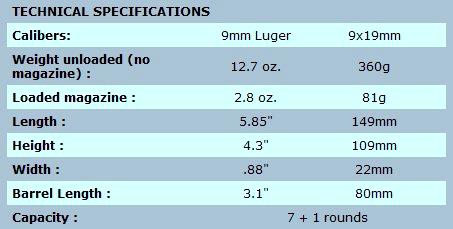
SUGGESTED RETAIL PRICES AS OF AUGUST 2007 (Not much change as of July 2008)
Actual prices, of course, will be whatever the marketplace decides. I bought my first blued slide PF-9 in Chattanooga, TN on August 8, 2007, for $269.00 plus sales tax. Prices in Fall of 2010 may be $75 to $100 higher. Prices in other areas of the country will vary. A good way to check current retail prices is to visit www.gunbroker.com.

The PF-9 pistol is a good-looking gun, and comes with one 7 round magazine, a pinky finger extension base plate, and a gun lock (padlock). Extra magazines may be ordered directly from Kel-Tec for $21.85 each. I have two extra magazines.

According to a knowledgeable PF-9 owner, two weak points in the PF-9 design are the plastic magazine release and the magazine follower. The mag release may wear out quickly unless care is taken to hold in the mag release button while inserting the mag. Mag followers may wear on the front left corner if you allow the slide to lock back on an empty mag very often. The negative effect of that is that your pistol will not lock back the slide consistently after the last round in the mag is fired.
I have read that a good way to shoot your PF-9 at the range is to always leave one cartridge remaining in the magazine, which will preclude the slide locking back, and which will then preserve the plastic follower. "Two Pistol Packer" on the KTOG Forum has created metal replacement parts that may wear better. Here is a link to his excellent instructions for disassembly, reassembly and replacement of various parts.
The original shipment date was supposed to be May of 2006, but it kept being postponed. Production did not start until September of 2006, and things got off to a rocky start with the new pistol.
The first 100 PF9s were mostly bought by the factory employees and distributors. George Kellgren (gun designer, chief engineer and owner of Kel-Tec) himself took the first 19 off the assembly line. PF-9s began to be released to the public in late September 2006.

The first run of PF-9s had many problems. (This is a summary of information presented by Two Pistol Packer on the KTOG Forums.)
1. Some early barrels had SHORT THROATS that would not chamber the longer 147 grain ammo.
Here's a photo I found in a KTOG forum post by Kel-Tec fan "Wilson," showing the old and new PF-9 barrels...
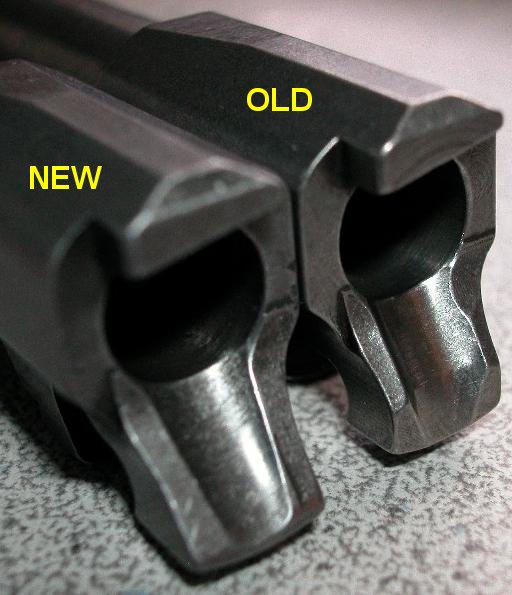

All who returned these first run models received back brand new parkerized guns with their old serial numbers stamped thereon. Almost all of the first model problems were corrected in short order, and production quality was quickly improved.
Newer PF-9s have a completely new barrel, with a longer feed ramp, to facilitate the use of hollow point bullets. Some PF-9s may still experience a problem with the trigger spring popping out of its groove. Beginning in July of 2007, Kel-Tec began installing a new trigger bar for the PF-9 with a deeper groove in it. On 01/17/07 Kel-Tec announced full production (between 700 and 1000 guns per week).
In case you are interested in the serial number of your PF-9, "Two Pistol Packer" has got a handle on that bit of info!
This is a photo of the newer barrel by itself, with the longer feed ramp:
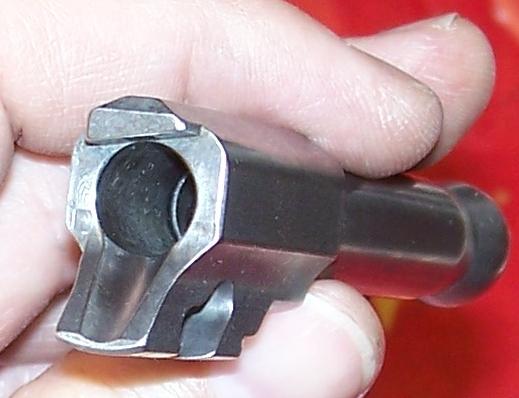

Kel-Tec says that a limited amount of Plus P rated ammunition can be used in the PF-9, so it is recommended that shooters do most of their practice with standard pressure ammo, and save the hot stuff for more serious use, firing enough of it through their pistols to assure compatibility with that particular gun. The slide of the PF-9 uses a bushingless design, the same as with Kel-Tec's other pistols.
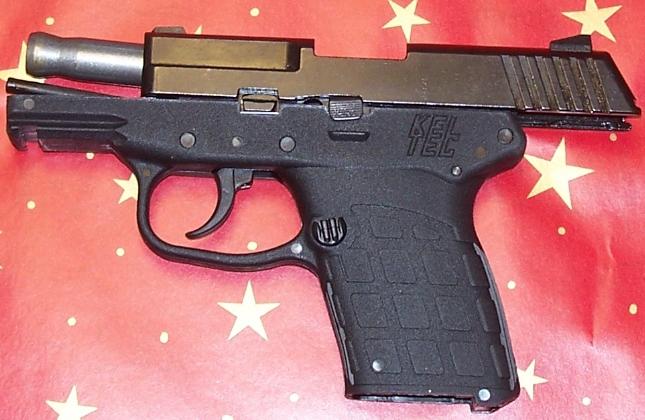
The magazine is made of steel with a plastic floorplate, and Kel-Tec includes a pinky extension in the box, if you care to install it. The trigger is double-action-only, and the pull is smooth and measures about 5 or 6 pounds. The trigger does not automatically reset while dry-firing, so if you want to test your trigger, you will need to reload a snap cap for each trigger pull. (With the P-11 you can just keep on pulling the trigger for dry firing.) As with all Kel-Tec pistols, DON'T DRY FIRE WITHOUT SNAP CAPS!
The magazine release is to the rear of the trigger guard in the usual place. The slide locks open after the last shot, and the slide release is handy for the thumb of a right-handed shooter. But the slide lock is tight, and I found it necessary to pull back a bit on the slide at the same time as pushing down on the slide release. As with all Kel-Tec pistols, there is no manual safety. The PF-9 is a hammer-fired design, and the hammer does not stick out the back of the slide.
The sights on the PF-9 are the common three-dot design, not dove-tailed. The rear sight is ajustable laterally for windage correction, and by shimming for elevation correction. Disassembly of the Kel-Tec PF-9 is quick and easy. Using a cartridge case rim as the only tool needed to pull out the take-down pin. Personally I like to cover up the pistol with a business card, and then use a small screw driver to pry out the take-down pin.

Important Note on re-assembly. There is a slight change of technique from the P-11 or P-3AT. After putting the slide/barrel back on the frame, you MUST push the barrel hood down into the slide before pushing the slide to the rear of the gun. That's the only way you will be able to have the barrel come forward adequately to insert the take-down pin properly. After you get the slide all the way on and back, lock it there with the slide lock lever. Then re-insert the take-down pin.

When assembling the gun, you must simultaneously push down on the barrel chamber,
pushing it below the level of the slide, as you slide the slide back onto the frame.
The slide, barrel, and other critical components are made of steel, and Kel-Tec offers matte blued, Parkerized, and hard chrome finishes.


Workmanship on the early models was quite rough. My 2007 "new in the box" PF-9 had numerous little scratches on the exterior of the slide, and the interior of the slide and breech face had what appeared to be hazy patches of the beginnings of rust. (After shooting and cleaning several times, this all went away. I believe the "rusty patches" were actually remnants of something similar to cosmoline.) My 2010 model seems to have been done with more care, and it looks pretty good.

Looks like rust, but it isn't - maybe it is lubricant

My 2010 model PF-9
The PF-9 has a fixed standing blade ejector; and the slide runs on aluminum rails installed in the frame....

...and the extractor has an external spring, held in by what is affectionately known as a "Frankenbolt" by Kel-Tec fans.

The PF-9 is only .88 inches thin. The PF-9's height, including the sights and magazine floorplate (sans pinky extension), measures 4.4 inches, and the length measures just 5.8 inches. The barrel length is 3.1 inches. The weight of the PF-9 is 14.6 ounces empty, including the magazine. The PF-9 uses a double recoil spring system, and has a plastic full-length guide rod.
The PF-9 is an excellent gun for carrying as a concealed weapon, if you have a handgun carry permit from your particular state. The Kel-Tec P3AT is excellent for ccw, too, but fires the weaker .380 caliber bullet (7 rounds). The P-11 is about the same size as the PF-9, however it is much thicker, and a bit heavier. The new PF-9 has a capacity of 8 rounds of the more powerful 9mm, and can handle even +P loads. In practice, the PF-9 feels like a slightly larger P-3AT, rather than a variation of the P-11. The trigger is also more like the P-3AT trigger. Here are some photos of the three Kel-Tec pistols together for size comparison.




Here is a page of photos comparing the relative sizes of the P-11 and the PF-9.
A good holster of some sort is helpful for pocket carry. Here is an inexpensive suede leather holster (made by Galco, I think) that works well for me. If you don't use a holster in your pocket, the sharp leading edge of the rail will rub a hole in your pocket while you walk.

After carrying the PF-9 a few months, I decided to use a spare "gun rug" for my P3AT as a holster, and I like it better than an actual holster. The gun slides in and out quite easily, and the square shape of the "rug" hides the gun-shaped outline. Here is a photo of me with the PF-9 in my right-hand front pocket. You really can't tell anything is there.

Bullet velocity from the PF-9 appears to be quite adequate. Here is a chart that presents some velocity testing of several brands of ammo by Gunblast.Com:

Kel-Tec warranty service is as good as it gets. If you have a problem with your PF-9 or other Kel-Tec firearm, the toll-free service number is: 1-800-515-9983.
Here's an illustration of typical Kel-Tec excellent service.
RANGE REPORT: I went to the range expecting good results, because the feed angle of the cartridge to the feed ramp looks pretty good:

I tried seven different varieties of 9mm ammo in my PF-9. Plain old Winchester ValuPak from WalMart, and six different hollow points. Here's a picture of my ammo lined up on my desk.

Listing the ammo from left to right....
Winchester ValuPak, 115 grain, FMJ
Remington Golden Saber, 124 grains
Speer Gold Dot +P, 124 grains
Hornady XTP, 124 grains
Federal, 115 grains
Corbon +P, 125 grains
Federal HydraShok, 124 grains
And here are the cartridges enlarged, in two rows. The first row of four are the ValuPak, Golden Saber, Gold Dot and Hornady:

The second row of cartridges are the Federal 115 grains, the Corbon +P, and the HydraShok 124 grains.

Prior to shooting my PF-9 I field stripped it, and cleaned it up good (check out the famous Kel-Tec "Fluff and Buff" treatment). The feed ramp was dull, so I polished it with some 600 sand paper, and emery cloth. Same treatment for the barrel. I oiled the frame grooves and barrel well with 3-in-1 household oil. (Some people are very picky about what oil they use, but I have not found that to be crucial at all. Just DON'T use WD40, which can gum things up, and which can creep into your cartridges.
I did not shoot for accuracy this time at the range, but simply to see which variety of 9mm cartridge would or would not prove to feed and fire reliably. I shot a magazine-full of each brand, one after the other, and noted which had problems. My plan is to quickly eliminate those which jam up right away. Later on I will get a larger quantity of a brand that appears to feed reliably, and try a hundred rounds of that single brand.
Results for todays range report:
My first magazine was of the Federal "Red Box" 124 grain Hydrashok ammo, and I had one failure to feed. My second magazine was of the Corbon +P 125 grain ammo, and it failed twice in one magazine!
I'm happy to report that ALL the other brands of hollow point, and of course the FMJ, fed fine, with no jams at all.
Looking carefully at the length and shape of the cartridges/bullets, I can see why the Corbon wanted to jam. It is a stubby looking thing! The Golden Saber fed with no problems, it appears to be close in shape to the FMJ, and it is priced at or below what the other cartridges sell for, so my plan is to get a hundred rounds of Golden Saber ammo, and see if it will go 100 rounds without any failures.
Here's a picture of my target. I shot rapid fire at five yards, and I am satisfied with the accuracy of the PF-9. The trigger is not tough, but it IS long. Really not bad at all! As you can see, I tend to shoot high and left, unless concentrating. My opinion is that the PF-9 will shoot quite accurately, if I do my part.

I also plan to wear my shooting glove next time I go shooting with the PF-9, for as you can see, it got a good start on chewing up my hand.

Concluding Observations: The PF-9 is much more of a pocket pistol than the P-11. The flatness and bit of extra lightness makes it feel more like a P-3AT that has grown up a little big. I have been carrying it in the front pocket of my khaki pants since I purchased it, and it truly works great as a pocketable 9mm pistol. The Kahr PM9 may work just as well, and have slightly smaller length and height (the PF-9 is flatter), but the PM9 is more than double the price of the Kel-Tec PF-9. I'm very glad I bought this weapon, and it has replaced my P-3AT as my everyday pocket gun.
One more remark about the PF-9 and pocket carry. I would NOT consider carrying it in my BACK pocket, as some would like to do. It is just a bit too large, which makes it drag down the rear of your pants, and also hard to draw. Here's a photo of my PF-9 in my back pocket:

If you insist on back pocket carry, you might rather try the Kel-Tec P3AT.
Here's a photo of my P3AT on top of my wallet, which I always carry in my back pocket.:

My third PF-9 (which I traded away for something some time ago) had a green frame/grip. I think it was my prettiest PF-9, and I wish I had it back. My present PF-9 is just plain old black.

Here's a comment I received from "Bob" on January 8, 2011....
"I enjoyed your review of the Kel-Tec PF-9. Because of your review, I purchased one for a backup gun (I'm a Police Offcier). I immediately took it to the range and had numerous problems. Keeping your review (and other reviews) in mind, I observed the dropped mag syndrome, FTE, FTF, and other problems. I noticed damage to the plastic mag follower, an old style barrel loading ramp, BUT a METAL mag release. I noticed the serial number was RRA-00. Thinking this was a low serial number and probably an early production gun, I contacted Kel-Tec. I was informed my PF-9 was manufactured in 9-2010. I discovered some of the metal mag releases still had the dropping problem. Kel-Tec made a modifications (recently) to the metal mag releases and the mag followers. They sent me 2 new mag followers and the new modified mag release. The same day I received the parts I tested the PF-9 on the range. Not one malfunction. I shot the CorBon 124gr rounds which have the angled, straight sided bullets with a flat nose (can't remember the model name). I will reload and test other bullet shapes and weights. I have not yet shot any 147gr which I understand is where the old-style barrel loading ramp plays a major role in feeding problems. Using a Crimson Laserguard sight, I was dead-on 10-ring up to 30 feet (I didn't shoot any farther). Out of 32 rds fired (off-hand, 2-hand hold), 24 in the 10-ring and 8 in the 9-ring. Needless to say, I was impressed with the little 3" barrel. Well done to Kel-Tec's tech people for quickly identifying and resolving the problems. With the personal (real person) service I recieved, their customer service is the best."
IMPORTANT RESOURCES FOR MORE INFORMATION: In writing this review I used my own experiences and photographs, and also got a lot of information from the official Kel-Tec web page; from the Gunblast.com review of the PF-9; and from articles on the KTOG Forums, especially the detailed research and statistics compiled by "Two Pistol Packer."
MORE LINKS:
Postive Video Review and Shooting with Hickok45
Wikipedia Article
PF9 Recommended for Off-Duty Police Carry
PoliceMag Review with Photos by Mike Detty
PoliceLink Discussion
Good Review by Fred Huddle
Nice Review by Ed Buffaloe
A Good Review by drfaulken
Another Good Review by "Riverside"
Complete Disassembly of the PF9, with photos and directions
Jeff Soyer's Compulsive PF9 Purchase (Alphecca Author)
17 Minute Video Review by "Nutnfancy"
XDTalk Photos and short review
Review with Photos at Tinkerswords
Review with Photos by Joel Johnston, LTC (Ret. US Army Ordnance Corps)
Shooting Illustrated Review with Photos
TexasHuntFish Range Report
Range Report by Dynamik1 at Handgunforum
Tale of Two Pocket Pistols (Be patient, he writes about his P11 first)
Zach Compares His PF9 with his Ruger LCP
Pistols and More Blog Review
Average Joe Reviews the PF9 with Photos
Well-written Review at Pocket-Defense.Com
Nice Review by Officer Lewis Ipso